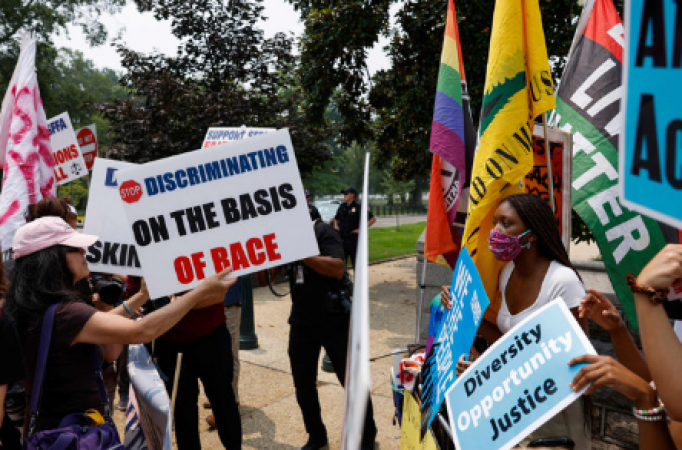
Washington: The use of race and ethnicity in university admissions was outlawed on Thursday by the US Supreme Court, dealing a severe blow to a long-standing practise that increased educational opportunities for African-Americans and other minorities.
One year after striking down the protection of a woman's right to an abortion, the court's conservative majority once more showed that it was willing to overturn liberal laws that had been in place since the 1960s.
Progressives criticised the ruling against "affirmative action," which was made by a court that was heavily influenced by three justices Donald Trump appointed during his presidency. Conservatives applauded the decision.
Also Bread: Paris in Flames: France Gripped by Unrest as Riots Erupt
President Joe Biden lamented the justices for "not being a normal court" and expressed his "severe disappointment."
In his remarks at the White House, he said, "Discrimination still exists in America." "I think that having a diverse student body makes our colleges stronger."
However, he rebuffed liberal demands to restructure the influential Supreme Court, including by adding to the nine justices who are all lifetime appointees, in an interview with MSNBC.
He said, "That might cause too much harm." "If we begin the process of trying to expand the court, we're going to politicise it perhaps forever in a way that's not healthy," the speaker warned.
The decision, which was reached by the justices 6–3 along conservative–liberal lines, is viewed as a significant setback for initiatives to increase diversity in business and government hiring as well as in school admissions.
While affirmative action was "well-intended," Chief Justice John Roberts argued in the majority opinion that it could not last indefinitely and amounted to unconstitutional discrimination against others.
Also Bread: Fed's "stress tests" indicate that the biggest banks would survive a severe recession
According to Roberts' writing, "the student must be treated based on his or her experiences as an individual, not on the basis of race."
The court ruled that universities were free to give applicants' backgrounds more weight than applicants who were more academically qualified, such as whether they experienced racism as children.
But according to Roberts, making a decision primarily based on a candidate's race—White, Black, or otherwise—is discrimination in and of itself.
"Our constitutional history does not tolerate that choice," he declared.
Justice Sonia Sotomayor responded invectively, charging that the majority was colorblind to the existence of "an endemically segregated society."
She wrote, "Ignoring race will not equalise a racially unequal society."
The University of North Carolina (UNC) and Harvard University, two of the country's oldest private and public universities, were sued over their admissions practises, and the court sided with the activist group Students for Fair Admissions.
Asian Americans applying to the two universities were allegedly discriminated against due to racial admissions policies.
In order to ensure a diverse student body and representation of minorities, Harvard and UNC, along with a number of other highly selective US universities, take an applicant's race or ethnicity into consideration.
The Civil Rights Movement of the 1960s gave rise to such affirmative action policies in an effort to address the legacy of discrimination against African Americans.
Due to significant advancements made by Black people and other minorities, some conservatives contend that the policy is no longer necessary.
"This is a great day for America," declared Trump, who frequently takes pride in his work to increase the court's conservative majority.
The ruling, according to Kenny Xu, a representative of Students for Fair Admissions, will lessen prejudice against Asian-American students.
He told CNN that they discriminate against Asians in order to make room for Black Americans.
"To have the same chance of admission as a Black person at Harvard, you had to have a SAT score 273 points higher if you were an Asian-American. Is that equitable? He mentioned the typical university exam in his statement.
But after the court overturned the famous 1973 "Roe v. Wade" decision guaranteeing a woman's right to abortion, the decision was yet another significant setback for progressives.
Almost immediately after abortion rights were no longer protected by the federal government, 50 percent of the states either outlawed or severely restricted the procedure.
The affirmative action decision may stop initiatives to give underrepresented minorities special consideration in the competitive admissions process, which could have an impact on many states and institutions.
According to Sotomayor, any university effort to base admissions decisions on criteria other than test scores would be put on hold.
Also Bread: Estonia's Strategic Move: Plan Unveiled to Transfer Frozen Russian Money, Reports Suggest
African American Democratic Senator Cory Booker dubbed it a "devastating blow" to the US educational system.
"Affirmative action has been a tool to break down systemic barriers, and we must continue to advance our ideals of inclusivity & opportunity for all," he wrote on Twitter.
Mayan McClinton, a 17-year-old Harvard summer school student, asserted that supporting minorities like herself benefits everyone.
She argued that it's unfair to assume that we're sort of denying these spots to more affluent white students who do have other opportunities.